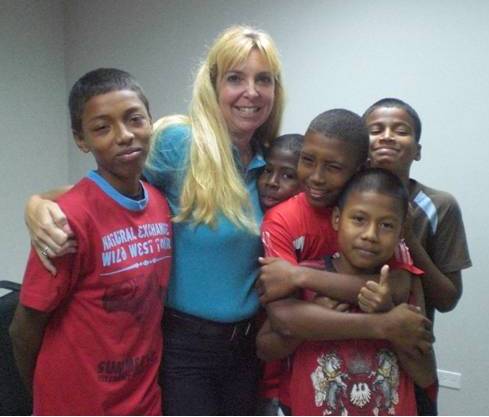
CityLinks exchanges facilitated by ICMA have helped government administrators and police in Panama and El Salvador take steps to adopt community-oriented crime prevention practices that have proven successful in the United States. To assist in these transitions, officers from U.S. police and sheriff’s departments have been showing their Central American counterparts how citizens’ police academies and school resource officers can supplement and strengthen crime prevention activities by the police.
These exchanges between professionals are a key feature of the Municipal Partnerships for Violence Prevention in Central America (AMUPREV) program, funded by the U.S. Agency for International Development (USAID) and implemented by ICMA. Partnerships include:
- The sheriff’s department and county of Pinellas County, Florida, and the cities of Colón and San Miguelito, Panama
- The police department and city of Santa Ana, California, and the cities of Sonsonate and Nahuizalco, El Salvador
- The police department and city of Arlington, Texas, and Panama City, Panama.
Throughout the exchanges, the partners address ways to adapt U.S. practices to local conditions and challenges, recognizing that the contexts in which police operate and the traditions in which they are trained differ from those that are familiar to police and citizens in the United States.
Pinellas and Panama
Most recently, in March 2012, Deputy Kelly Ford and Deputy Raphael Navarro from the sheriff’s department in Pinellas County traveled to Panama to provide training to police officers and community members in Colón and San Miguelito and to members of the national police at their headquarters in Panama City.
In their presentations, the Pinellas County officers explained how citizens’ academies provide community members with an education about the causes of crime and the nature of police work so that they can become engaged in crime prevention through productive police-community relationships in their neighborhoods. And they showed how school resource officers help create positive relationships between students and the police.

A student poses a question during a session focusing on the role of school resource officers.
In Colón and San Miguelito, participants in the training included police and representatives of municipal violence prevention committees, neighborhood watch programs, and nongovernmental organizations. The chief of police was among the attendees in each city. The school resource officer sessions also attracted school officials, teachers, and students involved in D.A.R.E. (Drug Abuse Resistance Education) programs.
Navarro and Ford also had an opportunity to follow up on an earlier visit to Panama by Pinellas County PAL Director Jerry Babcock. After visiting with young soccer players, Babcock arranged for the donation of sports equipment, which was delivered during the March visit. Representatives from Colón and San Miguelito are scheduled to visit Pinellas County in August.
ICMA Program Manager Lisa Lau also attended the sessions and posted her personal observations in the International Dispatches blog.
Santa Ana and El Salvador
In February, Chief Carlos Rojas and Officer Michael Gonzales from the police department in Santa Ana, California, conducted training sessions for municipal and national police and school resource officers in Sonsonate and Nahuizalco, El Salvador.
Sessions in both cities highlighted the role of the school resource officer in making schools a safe environment for teaching and learning, promoting an understanding of laws and their benefits, identifying problems in the immediate neighborhood that contribute to violence in the schools, maintaining a relationship with administrators and parents, and promoting a positive attitude toward police. The sessions drew a contrast between traditional reactive approaches to crime and proactive approaches that have been employed successfully in the United States.
Participants in both cities included students, school resource officers, local and national police, teachers and principals, and community leaders.
In a separate session, Sonsonate police were introduced to the general concept of community-oriented policing. The session attracted participants from the local police—individuals “drafted” from the military with little or no police training—and from the national civil police, who are generally better trained and equipped. Some municipal leaders attended as well, and the importance of the sessions was underscored by the presence of the mayors and local news media in both cities.
In the days following the training, Chief Rojas and Officer Gonzalez visited several schools where police were leading students in physical exercises, and Chief Rojas addressed students, explaining the differences between local and national police in terms of mission, role, and equipment. The next step in the partnership is a visit by one or two police officers, a teacher, and possibly other community representatives from Nahuizalco and Sonsonate to Santa Ana to shadow their counterparts and gain a deeper understanding of day-to-day interactions between police, communities and youth.
AMUPREV and Alcance Positivo
The AMUPREV program has two key objectives:
- To promote comprehensive municipal-based violence prevention strategies and programs with key Central American stakeholders and foster development of regional peer knowledge networks
- To provide training and technical assistance to local governments and community groups, in coordination with national police efforts and other municipal-based programs.
The program is scheduled to continue through September 2012, allowing time for partnership exchanges to continue among the participating cities and counties.
AMUPREV activities in Panama are complemented by the Alcance Positivo (community youth at risk) program in which ICMA is a partner on a team headed by Creative Associates International. Through Alcance Positivo, ICMA supports the development and strengthening of municipal violence prevention committees, which bring together community leaders, police, municipal staff, national government representatives, and other stakeholders. This program also provides direct assistance to the Child and Adolescent Police Unit of the national police as it develops community- and school-oriented initiatives for youth at risk.
To learn more about ICMA International, visit the website and the International Development topic in the Knowledge Network, or contact international@icma.org.
New, Reduced Membership Dues
A new, reduced dues rate is available for CAOs/ACAOs, along with additional discounts for those in smaller communities, has been implemented. Learn more and be sure to join or renew today!
